MAJOR SPOILERS FOR THE RINGS OF POWER EPISODE FIVE AHEAD!
“A complete consistency (either within the compass of The Silmarillion itself or between The Silmarillion and other published writings of my father’s) is not to be looked for, and could only be achieved, if at all, at heavy and needless cost. Moreover, my father came to conceive of The Silmarillion as a compilation, a compendious narrative, made long afterwards from sources of great diversity….To this may be ascribed the varying speed of the narrative and fullness of detail in different parts….and also some differences of tone and portrayal, some obscurities, and, here and there, some lack of cohesion.”
– The Silmarillion: Foreword by Christopher Tolkien
I would not lightly use the words of J.R.R. Tolkien’s son Christopher, famously critical of any and all attempts to adapt his father’s work for the screen, to deflect criticism from The Rings Of Power for the liberties it takes with the lore of Middle-earth in its fifth episode, but in this case I believe the defense is justified, if you’ll hear me out. It’s true that screenwriter Justin Doble has made some bold and controversial choices (controversial among Tolkien scholars and purists, that is; I’m not sure who else will care very much about alterations to the origins of mithril), and you need not feel compelled to appreciate the bold swings he’s taking if they don’t work for you, but – if this sort of thing is hindering your enjoyment of The Rings Of Power – I would encourage you to read that quote, in which Christopher explains away the many inconsistencies in the published Silmarillion as the result of unreliable in-universe narrators each telling their own version of events from which his father and later he himself stitched together their own heavily-abridged narrative.
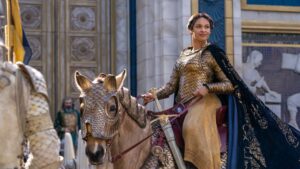
Now apply that same logic, if you can, to The Rings Of Power, which is already in many regards closer akin to The Silmarillion than to The Lord Of The Rings. Think of it not as an adaptation of any particular writing, but as a “compendious narrative” told from the perspective of several different unreliable narrators who may or may not be altering or embellishing the tale, as Tolkien “admitted” to doing in the Appendices (where it’s revealed that, for instance, none of the Hobbits’ names were really their names). Or imagine, as I must while I wait for a more satisfying answer in episode six, that the apocryphal Song of the Roots of Hithaeglir, which details a duel to the death between a Balrog and an Elven warrior over a tree containing the last Silmaril, inadvertently leading to the creation of mithril, is just a song: one containing numerous “obscurities”.
Honestly, it’s not so hard to believe that the Elves would write a self-aggrandizing song accrediting one of their own with the creation of mithril – a precious metal of unparalleled strength, pliability, and beauty, which could only be found in Valinor, Númenor, and in the Misty Mountains beneath the Dwarven city of Khazad-dûm. In Middle-earth (and by the end of the Second Age in all of Arda), Khazad-dûm was the only place where mithril could be obtained, but it was treasured by all the Free Peoples and servants of Sauron alike, so I actually think there’s something to the idea that each of them would individually come up with their own outlandish origin stories for mithril to support their claims to the swiftly dwindling deposits of this rare ore (and leave it to the Elves to base their claim around a Silmaril, to which they foreswore any claim when they engaged in three separate Kinslayings over the jewels).
Nor do the contents of the Song itself offend me, because a Silmaril did end up buried in the earth along with its bearer, Maedhros, and the Elves are the type to continue telling stories about the Silmarils long after their disappearance, whether they’re true or not. Sure, the Song is overwritten (it would have been so easy to say that the Silmaril’s light permeated the earth where it was buried, creating mithril, but then I guess we’d have missed out on the animated fight with the Balrog and the moral that “true creation requires sacrifice”), but even the most convoluted exposition sounds almost natural coming from Elrond (Robert Aramayo).
No, it’s what Gil-galad (Benjamin Walker) and Celebrimbor (Charles Edwards) have to say about mithril and its uses that’s both controversial, deeply confusing, and oddly compelling given that nothing about this subplot ought to work, quite frankly. Don’t get me wrong, I think it’s very silly that mithril can apparently stave off the effects of decay and that the Elves believe (or have been led to believe) that without it, they will begin fading within a year. Even if it’s a lie started by Sauron, it all hinges on two of the wisest Elves in Middle-earth not only becoming convinced that Elvendom is dying because Gil-galad’s favorite tree is rotting (and what does that prove, anyway?), but also on them reaching the conclusion that mithril is their deliverance based on an old song of disputable accuracy. Obviously, Sauron could be in Lindon or in Eregion, fanning the flames, but it’s silly nonetheless – and sillier still that Celebrimbor’s solution is to saturate the Elves in the incomparable light of mithril (how does one go about that, exactly?).
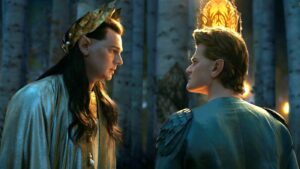
But the pay-off to all this set-up is too brilliant for me to write off this storyline as a lost cause just yet. Elrond, finally putting those diplomatic skills of his to good use, persuades Durin IV (Owain Arthur) that it would be in his best interests to make void the oath binding them both to secrecy about mithril, by encouraging the Dwarf-prince to use mithril as leverage over the gullible Elves who are eager (dare I say desperate) to buy it in bulk. Though Gil-galad assumes the worst of his young herald for orchestrating a deal with the Dwarves behind his back, the truth is that – until we know for certain whether mithril actually possesses any healing properties that could possibly help the Elves – the Dwarves stand to lose the most from this deal, as Elrond is essentially nudging Durin and his people down the path that will inevitably lead them deeper into the dark heart of the mountains in search of mithril.
For the time being, Aramayo’s Elrond and Arthur’s Durin make for the most delightful scene-partners with lively comedic banter that has routinely provided fans with memeable dialogue (“give me the meat, and give it to me raw”, innocuous enough with context, is one of those lines that seems destined, if not purposefully designed, to spawn a thousand spicy fanfics featuring the two characters). They have chemistry, with Disa as well as with each other, which is more than can be said of all the chaste straight monoamorous couples that The Rings Of Power wants its viewers to ship – no offense, but Eärien (Ema Horvath) and Kemen (Leon Wadham) scrubbing floors together offscreen just doesn’t cut it when you have the Dwarves talking so freely about their passion for each other.
And Eärien and Kemen don’t have the excuse that Arondir (Ismael Cruz Córdova) and Bronwyn (Nazanin Boniadi) have, which is that they’ve been too preoccupied recently with matters of war to give priority to matters of the heart…although, if we’re being brutally honest, not enough happens in the Southlands this episode to excuse the absence of any intimate scenes between these two star-crossed lovers who still can’t seem to muster any emotion stronger than apathy when they look into each other’s eyes. Arondir’s scenes with Theo (Tyroe Muhafidin), Bronwyn’s son, establish that the Silvan Elf has a place in their family-unit as a second father to the teen, but they all seem equally baffled as to how that happened.
Individually, or whenever they’re not asked to feign romantic attraction to each other, Córdova and Boniadi deliver far more dynamic performances. In a moving monologue towards the end of the episode, Bronwyn asks whether her and her people are destined to crawl back to the familiar embrace of darkness, mere minutes after the elderly Waldreg (Geoff Morrell) did just that, leading a contingent of the refugees from Tirharad to the enemy camp in search of their true god-king, Sauron. The experienced Morrell is another stand-out from the episode, nailing his character’s most crucial scene – when Waldreg, aggressively confronted by Adar (Joseph Mawle) over his use of the name Sauron, switches sides in an instant and even proves himself by sacrificing one of his fellow townsfolk, the boy Rowan (Ian Blackburn). There are shades of Abraham and Isaac in this story, except that Adar, whatever else he may be, does not intend to rule as a merciful god.
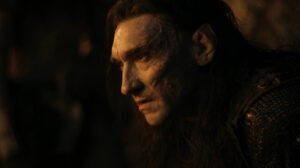
I think it’s safe to say, based on this episode, that Adar has ruled himself out as a potential Sauron – even apart from assaulting Waldreg for using the name, his stated intention to take apart the world and rebuild it from scratch doesn’t comfortably line up with what we know about Sauron’s motivations, as outlined in Morgoth’s Ring. There, it is said that Sauron “did not object to the existence of the world, so long as he could do what he liked with it”, in stark contrast to what is said of Sauron’s former master Morgoth, whose “one ultimate object” was the destruction of everything in existence. This suggests to me that Adar was turned by Morgoth and converted to his line of thinking (more evidence for my theory that he’s Maeglin).
This episode also instilled in me confidence that Halbrand (Charlie Vickers) really is just some guy from the Southlands, though he admits to committing unspeakable crimes in a dramatic sequence intercut with Waldreg swearing fealty to Adar. Halbrand may be a servant of Adar’s or Sauron’s seeking escape from his oaths, but I do not believe he is the Dark Lord himself. The fact that he only bribed Pharazôn (Trystan Gravelle) into giving him a Guild-crest so he could stay in Númenor and start a new life, coupled with his reluctance to join the Númenórean armies headed for Middle-earth, says to me that he had no plans to manipulate the progress of the war once it reached the Southlands. Now, he could have been planning to make headway with the Númenóreans while the Queen-Regent was gone, but if so, why abandon that plan for the sake of Galadriel (Morfydd Clark)? Why, unless he finally realizes that she is his one shot at salvation?
That being said, I was also convinced that the Stranger (Daniel Weyman) had good intentions at the end of episode three, when he selflessly helped the Brandyfoot family out of a tight spot…but now I’m not so sure. Weyman’s acting-choices have become more purposeful as the Stranger has slowly regained awareness, and they all point towards this character being both dangerous and fierce. His fall from the sky also conveniently erased any memory he might have had of the three mysterious white-robed women (including Bridie Sisson as “The Dweller”, whom you may remember many fans mistook for Sauron) who are now pursuing him and the Harfoots across Rhovanion for unknown reasons. These women, collectively referred to as the Mystics by Amazon, wear stylized depictions of the sun, moon, and stars on their persons, and one carries a sky disk on which is inscribed the very same constellation sought by the Stranger.
Now, I’m not saying the Mystics are definitely acolytes of the two Blue Wizards, I’m just saying there are canonical accounts of “secret cults and ‘magic’ traditions” being established in the east and south of Middle-earth (where the “stars are strange”, according to Aragorn) by these mysterious beings of celestial origin who arrived in the Second Age to combat Sauron, and I have long wanted The Rings Of Power to do something with the Blue Wizards anyway, and maybe they can if Amazon obtains the rights to the specific chapter of Unfinished Tales that deals with the Five Wizards, and this is turning into a tangent now but basically my theory is that the Stranger is Rómestámo a.k.a. Pallando a.k.a. the second Blue Wizard.
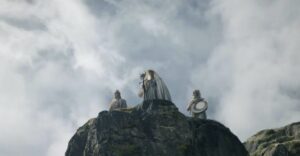
Blue Wizard or not, the Stranger’s magical abilities seem too diverse to belong to anyone but a sorcerer. A Balrog would only be able to control fire and shadow, Old Man Willow would only hypnotize, the Man in the Moon…well, I’m not entirely sure, but something tells me he wouldn’t be the type to create shockwaves, which is the Stranger’s go-to move when he or his loved ones are in danger. There’s also the cost of the Stranger’s magic to consider – every time he’s consciously used magic with just his bare hands, he’s hurt himself or someone around him. In episode five, he is injured by his own magic while protecting his friend Elanor Brandyfoot (Markella Kavenagh) from a pack of carnivorous eohippus, and later, while performing a healing spell on himself, hurts her too. This leads me to believe that his character arc this season will culminate in him either making or receiving a staff that will allow him to channel magic without hurting anybody.
The exact power and purpose of a Wizard’s staff is one of those questions to which there is no good answer, because Tolkien never provided one. He clearly considered them to be weapons in the hands of Wizards, as Gandalf makes use of his staff many times throughout The Hobbit and The Lord Of The Rings, and Wormtongue specifically forbids its use in the Golden Hall of Meduseld. Furthermore, Gandalf strips Saruman of all but a fraction of his former power by breaking his staff in Isengard, and a point is made of it when Gandalf’s staff is broken on the Bridge of Khazad-dûm. It is also said that all Five Wizards possessed one. But the staffs may be a relic of an early version of the story where the Wizards (with a capital W) were merely wizards (with a lowercase W), before Tolkien conceived of them as angels. It is hard to believe that any of the Maiar, the class of immortals to which Gandalf and his brethren belonged, would rely on a staff – though perhaps in their mortal bodies, such tools were required.
I have no doubt that there will be more discourse on this subject if and when the Stranger obtains his staff, so for the time being let’s shift our attention away from Middle-earth entirely to the island kingdom of Númenor, where it’s been easily four or five days since Tar-Míriel (Cynthia Addai-Robinson) pledged to escort Galadriel to the Southlands with five ships bearing five-hundred men-at-arms, yet somehow neither they nor anyone else in the kingdom has found time to change their clothes. It’s actually appalling that The Rings Of Power, with its gargantuan budget, still can’t afford more than a few costume-changes for its lead characters, particularly when so many of these characters are supposed to embody the very concept of opulence. Am I supposed to believe that the Queen-Regent of Númenor is out here wearing the exact same outfit and hairstyle from day-to-day, not even experimenting with different jewelry?
Maybe she’s a minimalist. That’s cool. But Pharazôn the Golden sure as hell isn’t a minimalist, so what excuse does he have for repeating outfits? At least the smaller-than-average wardrobe for each of these characters means that the camera gets to spend more time lovingly examining every detail of the clothes and hairstyles they do wear – from Míriel’s three gorgeous headpieces to Bronwyn’s reliable burnt-orange boots. But standing out from a sea of faux Roman and Medieval tunics in Númenor and flowy, pre-Raphaelite inspired gowns and robes in Lindon, the burnished silver plate-armor worn by Galadriel towards the end of this episode stands out to me as one of The Rings Of Power‘s most instantly iconic fits (it was, in fact, featured in some of the very first promotional images and posters). My only concern is that, if this suit of armor is as heavy and uncomfortable as it looks, it may hinder Clark’s ability to convincingly pull off the same graceful twirls she used in this episode to wipe the floor with a few Númenórean soldiers.

There’s a playful side to Clark’s Galadriel that shines through in this whimsical fight sequence, harkening back to Tolkien’s description of Elves in The Hobbit as flighty, teasing creatures. Yet naturally, this had led to complaints from certain viewers that she’s too playful after weeks of them calling her “emotionless” and “bland” (some of the vaguest, most tiring criticisms leveled against actresses), because people can’t seem to settle on what their issue is with her. They’ll bemoan that she’s nothing like the character Tolkien wrote, which is arguably just a fact, not a fully-formed opinion on the character Amazon has written based on the many different, often contradictory, accounts of Galadriel’s life and demeanor that Tolkien himself wrote.
I want to bring your attention back once more to the quote from The Silmarillion that I included at the top of this article, where Tolkien’s son states outright that the stories contained therein are not intended to be taken at face-value, for they are none of them necessarily true or unbiased in their account of what “really” happened. And if a complete consistency is not to be looked for in Tolkien’s own writings, how can we possibly expect to find it in a loose adaptation of the writings in question? In our desperation to have order (or canon), I fear that some of us would go so far as to strip Tolkien’s great tales of their inconsistencies and the complexities that arise as a result of these: the subtle hints pointing at hidden biases in each narrator’s voice for the reader to suss out on their own.
I fully understand the temptation, as did Tolkien, who by all accounts was a relentless perfectionist. He was many times throughout his life tempted to retroactively revise his published works to bring them into accordance with whichever new version of the Middle-earth mythos he had just developed: yet he stopped short of fixing even major continuity errors in The Hobbit at the urging of his friends, who warned him that in his desire for consistency he was sucking all the fun out of a simple children’s bedtime story. He caved once, rewriting an entire chapter of The Hobbit post-publication, but in that case he came up with an entire in-universe excuse for how that happened, with Bilbo taking the blame for writing down a false account of what transpired that frankly ought to still be included in copies of The Hobbit, as it becomes quite important later on in The Lord Of The Rings.
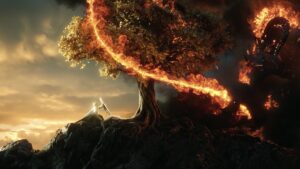
Anyway, none of this is to say that you have to like the choices The Rings Of Power made regarding mithril, its origins or its properties – just that every adaptation, and all of Tolkien’s works for that matter, contain moments of discrepancy like this one where the need for compelling drama or clarity takes precedence over the desire for continuity, because they are not religious scriptures containing any kind of objective truth. Just something to keep in mind going forward, as I’m sure we’ll all be having many more discussions along these lines in the very near future.
Episode Rating: 9/10